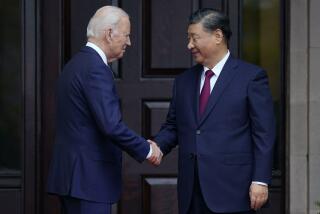Shultz Warns China on Expelling Western Reporters
- Share via
BEIJING — Secretary of State George P. Shultz warned Monday that if China expels additional Western journalists it may jeopardize its friendly--and often profitable--relationship with the United States.
In a speech at a banquet given by Shultz in honor of Chinese Foreign Minister Wu Xueqian, Shultz said American journalists reporting from China play a vital role in the relationship between the two nations.
He couched his remarks in elliptical and diplomatic language, but, by taking the unusual step of raising the subject at a high-profile social occasion, Shultz demonstrated U.S. concern that the recent expulsion of two journalists might lead to a purge of Western correspondents whose reports displease the Beijing government.
Reform Crucial Issue
The controversy over the expelled reporters provided a counterpoint to Chinese efforts to convince Shultz that recent political upheavals in China are domestic matters that will not affect the nation’s foreign policy or the stability of its economy.
In almost seven hours of meetings with Shultz, five of Beijing’s top leaders insisted that China will not abandon its economic reform policy.
The issue is a crucial one for the Beijing government because economic instability could frighten away American investment and trade, which has become increasingly important to the Chinese economy.
Shultz did not question those assurances in public, but by underlining the expulsion of the journalists, he made clear Washington’s concern that the increasing influence of orthodox Marxists in the Beijing government could turn the nation toward isolationism.
A senior State Department official said later that Shultz, in his private meetings, had spelled out in far more specific terms the U.S. displeasure at the ouster of New York Times correspondent John F. Burns and Lawrence MacDonald, an American citizen employed by Agence-France Presse, the French news agency.
Shultz conferred Monday with Zhao Ziyang, the premier and acting Communist Party leader; Li Xiannian, the largely ceremonial president; Wu, the foreign minister; Zhang Aiping, the defense minister, and Li Peng, a vice premier and one of the leaders of the orthodox Marxist camp. Shultz is scheduled to confer today with Deng Xiaoping, China’s top leader.
According to the New China News Agency, Zhao told Shultz: “The reform and open policies have greatly benefited the Chinese people and enjoy their heartfelt support. A change in these policies is out of the question.”
Although the major focus of the Shultz visit has been U.S.-Chinese relations, State Department spokesman Charles Redman said the secretary also discussed the latest Soviet arms control proposal for an early agreement to ban intermediate-range nuclear missiles from Europe. China is known to oppose any agreement that would remove the missiles from Europe while leaving them in Asia.
No Signs of Friction
Of Shultz’s meetings Monday, the most interesting may have been the one with Li Peng, the vice premier, who is thought to be a favorite of the orthodox Marxists bidding for power following last month’s ouster of party leader Hu Yaobang.
Li is considered a champion of economic central planning and is thought to be more sympathetic to the Soviet Union than many other Chinese leaders. He knew Soviet leader Mikhail S. Gorbachev when both were students in Moscow in the 1950s.
Although Li is not Washington’s favorite Chinese leader, U.S. officials said there were no signs of friction in the meeting. One senior official said Shultz and Li “focused largely on economics,” but declined to elaborate.
Li was quoted by the Chinese news service as pledging to continue to allow Chinese students to study abroad, apparently as an indication that China’s crackdown on student demonstrators in recent weeks will not be allowed to affect the future of the country’s intellectuals.
More to Read
Sign up for Essential California
The most important California stories and recommendations in your inbox every morning.
You may occasionally receive promotional content from the Los Angeles Times.










